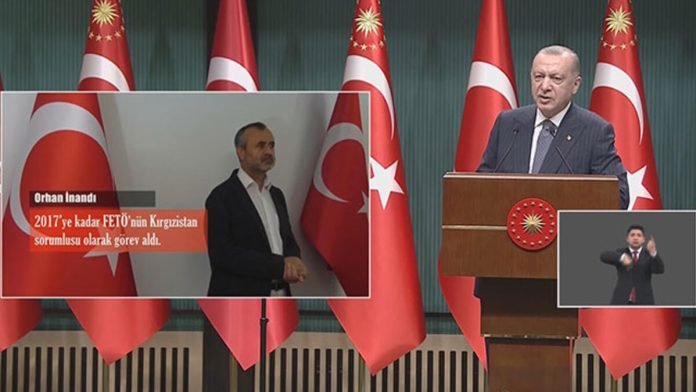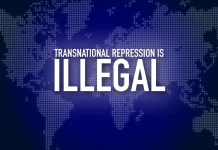
Four members of the US Senate Foreign Relations Committee — Democrats Jeff Merkley of Oregon and Ben Cardin of Maryland, and Republicans Marco Rubio of Florida and Bill Hagerty of Tennessee — have introduced the Transnational Repression Policy Act to keep authoritarian governments in check and prevent their “long arm” from impeding human rights abroad.
According to a press release from the office of Senator Merkley, bipartisan and comprehensive legislation would establish a new US policy to hold foreign governments and individuals accountable when they stalk, intimidate or assault people across borders, including in the US.
This bill would require the secretary of state along with other relevant heads of Federal departments and agencies to present a report to Congress on a US strategy to address transnational repression and enhance international awareness of it; instruct the US intelligence community to identify perpetrators of transnational repression and their tools, and share relevant information with like-minded partners; and require the US president submit a list to Congress of foreign individuals who should have sanctions imposed on them because they, knowingly and unknowingly, directly engaged in transnational repression.
“The Transnational Repression Policy Act proposes a number of essential policy reforms to address transnational repression,” said Michael J. Abramowitz, president of Freedom House, a rights group that has published several reports revealing tactics of authoritarian leaders to suppress their critics living abroad.
Since a coup attempt in July 2016 the government of Turkish President Recep Tayyip Erdoğan has employed extralegal methods to secure the return of its critics after its official extradition requests were denied.
Most recently Turkey’s National Intelligence Organization (MİT) confirmed in its annual report that it conducted operations for the forcible return of more than 100 people with alleged links to the Gülen movement.
“… [M]ore than 100 members of the [Gülen movement] from different countries were brought to Turkey as a result of the [agency’s] increased operational capacity abroad,” MİT’s 2022 report said.
Vice President Fuat Oktay earlier said in a speech in parliament that Turkish agents had conducted “diplomacy” with their counterparts in countries where Turkish nationals were abducted.
Turkey’s efforts at transnational repression against critics abroad do not seem to be winding down. Most recently, Uğur Demirok, a Turkish businessman who went missing in Azerbaijan on September 6, was abducted and illegally brought to Turkey by MİT.
Erdoğan has been targeting followers of the Gülen movement, inspired by Turkish Muslim cleric Fethullah Gülen, since the corruption investigations of December 17-25, 2013, which implicated then-prime minister Erdoğan, his family members and his inner circle.
Dismissing the investigations as a Gülenist coup and conspiracy against his government, Erdoğan designated the movement as a terrorist organization and began to target its members. He intensified the crackdown on the movement following the abortive putsch in 2016 that he accused Gülen of masterminding. Gülen and the movement strongly deny involvement in the coup attempt or any terrorist activity.
The government’s campaign has mostly relied on renditions, in which the government and its intelligence agency MİT persuade the relevant states to hand over individuals without due process, using various methods. The victims have faced a number of human rights violations including arbitrary arrests, house raids, torture and ill-treatment during these operations.
An SCF report, released in October, 2021 and titled “Turkey’s Transnational Repression: Abduction, Rendition and Forcible Return of Erdoğan Critics,” focused on how the Turkish government under President Erdoğan has used extrajudicial and illegal methods for the forcible transfer to Turkey of its citizens abroad.
Another SCF report, “Turkey’s Transnational Repression: Abuse of asset freezing mechanisms under the pretext of prevention of terrorist financing,” underlined that Turkish government’s decisions to freeze assets based on the pretext of preventing the financing of terrorism have been weaponized to suppress critics abroad as a further means of Turkey’s transnational repression.
In its report released in August 2021, SCF shed light on the Turkish government’s tactics to abuse INTERPOL to target political opponents who have done nothing more than criticize the government.
In several of these cases the UN Working Group on Arbitrary Detention (WGAD) concluded that the arrest, detention and forced transfer to Turkey of Turkish nationals were arbitrary and in violation of international human rights norms and standards.
Dr. Dana Moss, who developed the term “transnational repression,” in an interview with SCF called on the United Nations to appoint a special rapporteur to study the practice. “I would like to see the United Nations, the EU human rights arms, bringing more attention to this issue. Perhaps the UN could appoint a special rapporteur to study the issue,” she said.














